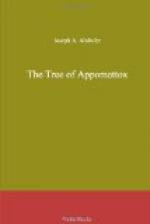He stopped suddenly and put away his violin. There was a hush, and then a long roll of applause, not loud, but very deep.
“I hear Pendleton calling,” said Harry to Dick.
“So do I,” said Dick. “I wonder what they’re doing there. Have you heard from your father?”
“Not for several months. I think he’s in North Carolina with Johnston, and I mean to go home that way. I’ve a good horse, and he’ll carry me through the mountains. I think I’ll find father there. An hour or two ago, Dick, I felt like a man and I was a man, but since De Langeais played I’ve become a boy again, and I’m longing for Pendleton, and its green hills, and the little river in which we used to swim.”
“So am I, Harry, and it’s likely that I’ll go with you. The war is over and I can get leave at once. I want to see my mother.”
They stayed together until night came over Appomattox and its famous apple tree, and a few days later Harry Kenton was ready to start on horseback for Kentucky. But he was far from being alone. The two colonels, St. Clair, Langdon, Dick, De Langeais, Colonel Winchester and Sergeant Whitley were to ride with him. Warner was to go north and Pennington west as soon as they were mustered out. Dick wrung their hands.
“Good-by, George! Good-by, Frank! Old comrades!” he said. “But remember that we are to see a good deal of one another all through our lives!”
“Which I can reduce to a mathematical problem and demonstrate by means of my little algebra here,” said Warner, fumbling for his book to hide his emotion.
“I may come through Kentucky to see you and Harry,” said Pennington, “when I start back to Nebraska.”
“Be sure to come,” said Dick with enthusiasm, “and remember that the latch string is hanging out on both doors.”
Then, carrying their arms, and well equipped with ammunition, food and blankets, the little party rode away. They knew that the mountains were still extremely unsettled, much infested by guerrillas, but they believed themselves strong enough to deal with any difficulty, and, as the April country was fair and green, their hearts, despite everything, were light.
CHAPTER XVIII
THE FINAL RECKONING
They rode a long time through a war-torn country, and the days bound the young men together so closely that, at times, it seemed to them they had fought on the same side all through the war. Sergeant Whitley was usually their guide and he was an expert to bargain for food and forage. He exhibited then all the qualities that afterward raised him so high in the commercial world.
Although they were saddened often by the spectacle of the ruin the long war had made, they kept their spirits, on the whole, wonderfully well. The two colonels, excellent horsemen, were an unfailing source of cheerfulness. When they alluded to the war they remembered only the great victories the South had won, and invariably they spoke of its end as a compromise. They also began to talk of Charleston, toward which their hearts now turned, and a certain handsome Madame Delaunay whom Harry Kenton remembered well.




